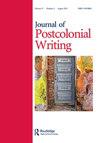纳姆瓦利·斯贝尔《旧漂流》(2019)中(去)殖民的政治与诗学
IF 0.4
3区 文学
0 LITERATURE
引用次数: 0
摘要
本文章由计算机程序翻译,如有差异,请以英文原文为准。
Politics and poetics of (de)colonization in Namwali Serpell’s The Old Drift (2019)
ABSTRACT This article focuses on the politics and poetics of (de)colonization that Namwali Serpell puts in place in her debut novel The Old Drift. It argues that she first of all addresses problematic (post)colonial representations particularly by explicitly referring to and debunking colonialist Percy M. Clark’s The Autobiography of an Old Drifter. Moreover, she allows for what Jacques Rancière has called a “re-configuration” of the “distribution of the sensible” by staging what Sara Ahmed has named “willful” characters who tackle the legacy of Scottish explorer David Livingstone, but who also live a historic moment for the Zambian nation, that of its decolonization/independence. Finally, it analyses the issues of Eurocentrism and Serpell’s willingness to decolonize the imaginary and the mind by focusing on alternative sources of historical knowledge: this enables both the characters and the readers to “wake up from the spell of Eurocentrism” in order to favour a form of “pluriversality”.
求助全文
通过发布文献求助,成功后即可免费获取论文全文。
去求助
来源期刊

Journal of Postcolonial Writing
LITERATURE-
CiteScore
0.80
自引率
0.00%
发文量
73
期刊介绍:
The Journal of Postcolonial Writing is an academic journal devoted to the study of literary and cultural texts produced in various postcolonial locations around the world. It explores the interface between postcolonial writing, postcolonial and related critical theories, and the economic, political and cultural forces that shape contemporary global developments. In addition to criticism focused on literary fiction, drama and poetry, we publish theoretically-informed articles on a variety of genres and media, including film, performance and other cultural practices, which address issues of relevance to postcolonial studies. In particular we seek to promote diasporic voices, as well as creative and critical texts from various national or global margins.
 求助内容:
求助内容: 应助结果提醒方式:
应助结果提醒方式:


